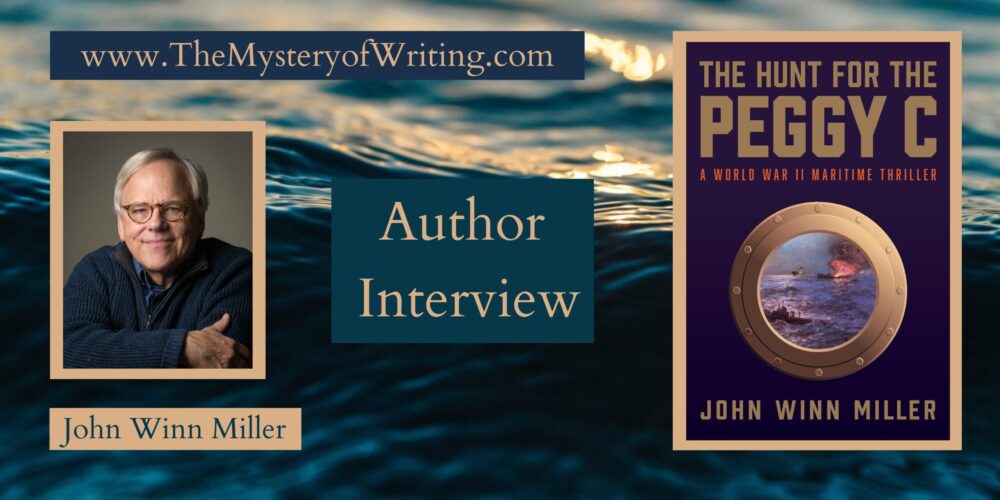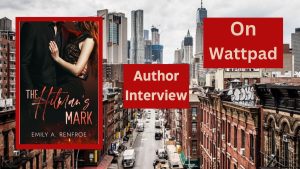The Hunt for the Peggy C, debut historical thriller by John Winn Miller
Author Interview + Book & Author Info + Author Pet Corner!
Don’t miss any author interviews. Click the link here to read more.
The Hunt for the Peggy C
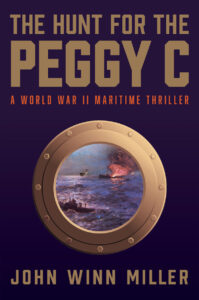 John Winn Miller’s THE HUNT FOR THE PEGGY C, a semifinalist in the Clive Cussler Adventure Writers Competition, captures the breathless suspense of early World War II in the North Atlantic. Captain Jake Rogers, experienced in running his tramp steamer through U-boat infested waters to transport vital supplies and contraband to the highest bidder, takes on his most dangerous cargo yet after witnessing the oppression of Jews in Amsterdam: a Jewish family fleeing Nazi persecution.
John Winn Miller’s THE HUNT FOR THE PEGGY C, a semifinalist in the Clive Cussler Adventure Writers Competition, captures the breathless suspense of early World War II in the North Atlantic. Captain Jake Rogers, experienced in running his tramp steamer through U-boat infested waters to transport vital supplies and contraband to the highest bidder, takes on his most dangerous cargo yet after witnessing the oppression of Jews in Amsterdam: a Jewish family fleeing Nazi persecution.
The normally aloof Rogers finds himself drawn in by the family’s warmth and faith, but he can’t afford to let his guard down when Oberleutnant Viktor Brauer, a brutal U-boat captain, sets his sights on the Peggy C. Rogers finds himself pushed to the limits of his ingenuity as he evades Brauer’s relentless stalking, faces a mutiny among his own crew, and grapples with his newfound feelings for Miriam, the young Jewish woman whom, along with her family, he must transport to safety.
In the end, Rogers makes the ultimate sacrifice to save the people he has grown to love – he uses his beloved ship and the highly explosive fuel it is carrying to vanquish Brauer for good. THE HUNT FOR THE PEGGY C is a masterpiece laced with nail-biting tension and unexpectedly heartwarming moments that any reader, not just fans of naval fiction, will enjoy.
To purchase The Hunt for the Peggy C, click on any of the following links: Amazon, Barnes and Noble & IndieBound
The Hunt for the Peggy C — Author Interview with John Winn Miller
The Hunt for the Peggy C is set at the beginning of World War II. What drew you to writing about that time period?
Believe it or not, I have no idea. My debut novel was a dream project—literally. Years ago, I had been watching a terrible action-adventure movie (I don’t remember which one) with my young daughter Allison (who now plays Maggie on ABC’s A Million Little Things), and I kept telling her, “I know I could write a better script than this.” That night I had a dream, and when I woke up, I knew the first and last scenes and the name of the ship. That was all.
So, like Michelangelo used to say, I knew there was a figure in that block of stone—in my case, a story—and all I had to do was spend years trying to chisel it free. The Hunt for the Peggy C screenplay and other scripts and a TV pilot I wrote attracted some interest in Hollywood but no sales.
When COVID hit, and my wife Margo and I were stuck at home with our two standard poodles and Maine coon cat, I decided it was time to live up to the dream that had been the reason I had become a journalist: to learn how to write so I could become a novelist.
Tell us about your research process for The Hunt for the Peggy C:
When I retired from journalism for the first time (a.k.a. took a buyout), I was determined to be a screenwriter. So I took online courses, attended conventions, and read countless books on screenwriting. I found it to be quite different from writing news stories. It was more like haiku with short, cryptic descriptions and sparse, often misleading dialogue, and scenes were limited to only what could be seen on screen.
I repeated the same process when I wanted to write a novel because it is so different from screenplays and news stories. The possibilities for point-of-view, descriptions, internal dialogue and plot structure are endless.
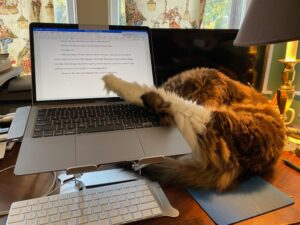
Then I had to learn about my subject. I have read countless books about World War II since I was young. But I had never been on a U-boat or a tramp steamer, and I knew next to nothing about the sea. As a result, I spent months reading histories, websites, historical archives, and first-hand accounts and watching documentaries and YouTube videos. I wanted all the history and technical details—and there are a lot of both—to be accurate. I even went so far as to study wartime logs by U-boat captains so I could accurately describe the moon’s stage during each phase of the chase at the heart of The Hunt for the Peggy C.
I was lucky to have several former sailors—including two submarine officers and my college roommate—double-check my naval descriptions and lingo. One of my Jewish cousins was kind enough to read a draft to ensure I was accurate and not inadvertently offensive. Plus, I hired a doctoral student from the Department of War Studies at King’s College London to review the manuscript for historical errors. Surprisingly, several readers of my Advance Reader Copy also offered helpful suggestions and corrections.
Finally, I hired Chris Evans, author of wartime novels and former Random House editor, as my development editor. His expertise and writing advice proved to be invaluable.
What would you like readers to know about Captain Jake Rogers, the main character in The Hunt for the Peggy C?
The 38-year-old Rogers is a man without a country, having fled the United States after a fight at the US Naval Academy that he feared made him a murderer. He found refuge on the Peggy C, an obsolete but still operating tramp steamer that traveled from port to port in search of cargo, whether legal or not.
As he rose to be captain of the ship, his only home, Rogers became a hardened taskmaster; it took iron discipline to keep in line a crew of often ill-educated, shiftless vagabonds who became sailors after failing at everything else, some including crime.
He also became more cynical about people who claimed to be patriots or bound by a sense of honor. To him, they were suckers lost in the romanticized world of poems and novels, which Rogers secretly consumed at a voracious pace. But when he experienced Nazi-occupied Holland and witnessed first-hand the brutal treatment of Jews, Rogers made a fateful decision, first for money and then, much to his surprise, for love.
It is only after he smuggled a Jewish family out of Amsterdam for a promised colossal reward and gradually fell in love with the eldest daughter Miriam that he came to believe it is more important to do the right thing than the most profitable thing.
You have an extensive background as a writer, including award-winning investigative reporter, editor, foreign correspondent, editor, newspaper publisher, and screenwriter. How did that background help or hinder you as a novelist?
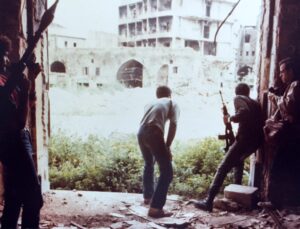
Each phase of my bizarre career was a learning experience. I learned to write clear, straightforward prose as a reporter. I also learned how to quickly become an expert through research and interviews on almost any subject, especially during my time as an investigative reporter.
As a political reporter, I learned to study character and speech patterns and to pay particular attention to body language. I would subject whatever I was told to rigorous vetting, knowing politicians often flitted in and out of gray areas without remorse.
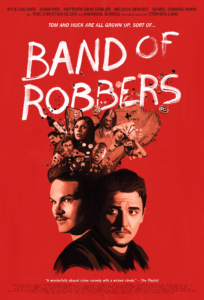 Writing screenplays taught me about character arcs and how to structure a thriller with crisp dialogue and precise descriptions.
Writing screenplays taught me about character arcs and how to structure a thriller with crisp dialogue and precise descriptions.
During my time as a foreign correspondent based in Rome for The Associated Press and The Wall Street Journal/Europe, I developed the habit of using all five senses in reporting.
I would write not only about what someone told me but their tone, what they were wearing, the smell of their cologne or perfume, the setting, the weather, and the historical context. Almost no detail was too small, although many of my observations never showed up in my dispatches from Italy or exotic places like India with Pope John Paul II, Bulgaria, or warzones in Eritrea, Chad, and Lebanon.
A Lexington, Kentucky, native, you have traveled and lived in a variety of places before returning to your roots. How have all those places impacted you as a writer? What do you love about living back in your hometown?
Everywhere I lived or visited in my far-flung travels had its own personality and spirit, informed as much by the people as the landscape. Imagine sitting in the desert with Eritrean guerrillas, dipping your fingers into a warm pot of sorghum topped with fire-roasted lamb–my meal every day for a week–all while rival guerrilla groups were hunting for us.
Or being awash in a sea of hundreds of thousands of pilgrims—many, if not most, Muslims or Hindus—who traveled for miles to stand in awe of the Roman Catholic leader Pope John Paul II.
Or flying at a moment’s notice into one country after another, interviewing terrorists, hustling to disaster scenes, spending the night atop an erupting Mount Etna, or finding delightful stories everywhere about such things as the seventeen saints named Valentine or the real Maltese Falcon on the island of Malta.
You cannot help but be moved and affected by all those experiences. Perhaps, the greatest impact for me was a greater sense of empathy with the diverse people and places of the world. I think it also sharpened my senses and made me a better writer.
Plus, I was lucky to be raised by parents and grandparents who loved sitting around a roaring fire on holidays, reciting poetry by heart, and telling jokes or incredible true stories about people they knew. It sparked my vivid imagination and made me a voracious reader of history and tales of adventure.
As a result, my home will always be Lexington, KY, the birthplace of five generations of Millers where I grew up, graduated (barely) from the University of Kentucky, and worked at my first domestic newspaper. It is a magical place with white-fenced horse farms dotting undulating hills of bluegrass. There is a lot of culture because of the two universities in town where I taught media literacy courses.
And my childhood friends, my sister, one of my brothers, and many colleagues still live here. Spring and fall are distinct seasons, each with a riot of colors and cool breezes celebrated with afternoons at Keeneland Racetrack, watching a pretty good college basketball team, and enjoying some mighty fine bourbon.
No wonder I keep coming back.
What are you working on now?
I stunned myself when I immediately started writing a sequel after selling The Hunt for the Peggy C to Bancroft Press. I was even more stunned when I finished it and began the third volume with many of the same characters in different phases of World War II.
That means I am doing three things at once: publicizing the first book, editing the second one, and writing the third novel. I never intended to do more than one novel. But my publisher, Bruce Bortz, said I should keep writing, and I did.
I am also trying to sell a TV pilot that my brother Harry, a film editor, writer-director John Harrison, and I wrote. You could say I’m staying pretty busy.
Words of Wisdom for Aspiring Writers:
Find your own voice. One of the many mistakes I made in early drafts of The Hunt for the Peggy C was trying to write like John le Carré, Donna Tartt, or Tom Wolfe, using brilliantly constructed long sentences replete with semi-colons, metaphors, and pithy asides.
That didn’t work at all.
So, I took lessons from them on style, rhythm, and descriptive writing and used that knowledge to develop my own simpler, fast-paced style with a dash or two of complex sentences.
Great advice!
Author Pet Corner!
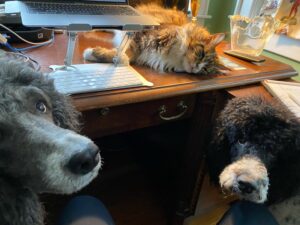
John Winn Miller — Author of The Hunt for the Peggy C
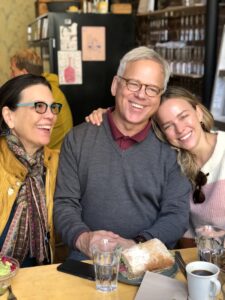
John Winn Miller is an award-winning investigative reporter (Pulitzer finalist), foreign correspondent, editor, newspaper publisher, screenwriter, movie producer, and novelist. The Lexington, Ky., native also produced four indie films, including Band of Robbers, written and directed by Adam and Aaron Nee (who recently wrote and directed The Lost City).
He has taught Media Literacy classes at his alma mater, the University of Kentucky, and Transylvania University. He is also a second-degree black belt in Shaolin karate.
Miller and his wife, Margo, live in Lexington with two standard poodles and a Maine Coon cat.
Their daughter Allison Miller is an actress-screenwriter-director currently starring in the ABC series A Million Little Things.
To learn more about John, click on any of the following links: Web Site, Twitter, Instagaram & Facebook
Elena Taylor/Elena Hartwell
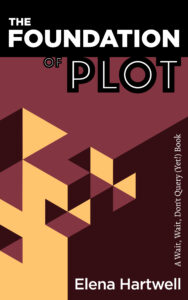
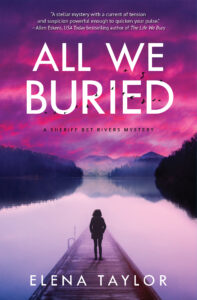 All We Buried, available now in print, e-book, and audio.
All We Buried, available now in print, e-book, and audio.
Silver Falchion Award Finalist, Best Investigator
Foreword INDIE Award Finalist, Best Mystery
The Foundation of Plot, a Wait, Wait, Don’t Query (Yet!) guidebook.
Header image by PubliCo on Pixabay

